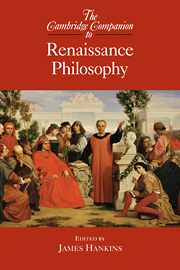Book contents
-
Frontmatter
- 1
Introduction
- Part I
Continuity and Revival
- 2
The philosopher and Renaissance culture
- 3
Humanism, scholasticism, and Renaissance philosophy
- 4
Continuity and change in the Aristotelian tradition
- 5
The revival of Platonic philosophy
- 6
The revival of Hellenistic philosophies
- 7
Arabic philosophy and Averroism
- 8
How to do magic, and why philosophical prescriptions
- Part II
Toward Modern Philosophy
-
Appendix: Brief biographies of Renaissance philosophers
-
Bibliography
-
Index
3 - Humanism, scholasticism, and Renaissance philosophy
from Part I - Continuity and Revival
Published online by Cambridge University Press: 28 November 2007
- Frontmatter
- 1 Introduction
- Part I Continuity and Revival
- 2 The philosopher and Renaissance culture
- 3 Humanism, scholasticism, and Renaissance philosophy
- 4 Continuity and change in the Aristotelian tradition
- 5 The revival of Platonic philosophy
- 6 The revival of Hellenistic philosophies
- 7 Arabic philosophy and Averroism
- 8 How to do magic, and why philosophical prescriptions
- Part II Toward Modern Philosophy
- Appendix: Brief biographies of Renaissance philosophers
- Bibliography
- Index
Summary
Another species of mitigated scepticism, which may be of advantage to mankind … is the limitation of our enquiries to such subjects as are best adapted to the narrow capacity of human understanding … A correct Judgment … avoid[s] all distant and high enquiries, confines itself to common life, and to such objects as fall under daily practice and experience, leaving the more sublime topics to the embellishment of poets and orators, or to the arts of priests and politicians.
(David Hume, An Enquiry Concerning Human Understanding, XII)Humanism as a form of culture
It is apt to be forgotten by students of the Renaissance that the abstract noun “humanism,” with its cognates in Latin and the modern languages, is not attested for the period of the Renaissance itself, but began to be widely used only in the early nineteenth century. It was in the latter period, under the influence of Hegel, that the modern addiction to reifying ideologies and social trends using nouns formed from -ismos, the Greek suffix indicating nouns of action or process, began to take hold. Humanismus, humanisme, and umanesimo, the German, French, and Italian forms of the word respectively, eventually embraced two broad families of meaning. The first family understood humanism in the sense of classical education: the study of ancient literature in the original languages. It was in this sense that Georg Voigt in his seminal work, Die Wiederbelebung des classischen Altertums oder das erste Jahrhundert des Humanismus (1859), retrofitted the word to signify the Renaissance movement to revive classical studies. In Italy the word umanesimo broadened its meaning somewhat to include Italy’s literary production in the Latin language from Petrarca to Pietro Bembo.
- Type
- Chapter
- Information
-
The Cambridge Companion to Renaissance Philosophy , pp. 30 - 48Publisher: Cambridge University PressPrint publication year: 2007
- 18
- Cited by



